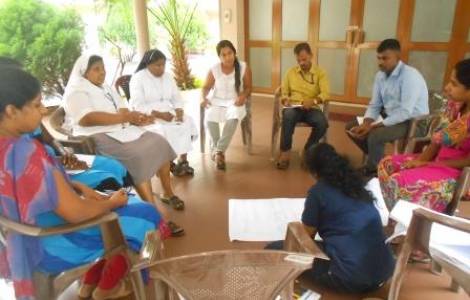
Caritas
Colombo (Agenzia Fides) - The Catholic Church in Sri Lanka supports the "steps of reconciliation" initiated by the national government after the civil war: is what was said to Fides by Bishop Harold Anthony Perera, who heads the diocese of Kurunegala, and is president of the national Commission of "Justice, peace and human development". The Bishop recalled that the country "lived a long and bitter civil war", which began in 1983, caused by ethnic tensions between the majority Sinhalese and the Tamil minority, in the northeast of the island.
After over 25 years of violence, the conflict ended in May 2009 when government forces conquered the last area controlled by Tamil Tiger rebels (organization founded in 1976). Seven years after the end of the conflict, recrimination on abuses by both sides continue.
The government of President Maithripala Sirisena, who came to power in 2015, "has implemented concerted efforts for national reconciliation", said Bishop Perera, adding that this process has "the full support of the Church".
"We cooperate with the government in this process of reconciliation for the common good of the nation", said Mgr. Perera to Fides.
The country has a population of 21.2 million inhabitants, of Buddhist majority (70%). Christians are about 6%, while Hindus and Muslims are other religious minorities.
The Catholic Church in Sri Lanka, noted the president, "is doubly blessed because we have baptized people who belong to both the Sinhalese and the Tamil community". Given this presence of Sinhalese and Tamil faithful, the Catholic community can be "a catalyst element for harmony, peace, reconciliation and brotherhood in a pluralistic society", he remarks.
The national Commission for Justice, Peace and Human Development of the Episcopal Conference of Sri Lanka has launched a number of innovative initiatives to contribute to reconciliation. All the apostolate which includes activities such as education, health, social development and other pastoral activities "is oriented to the reconciliation of the country", added the Bishop.
Reconciliation measures adopted by the government represent a "right path", although "it is a process that takes time to bear fruit, and long-term results," he says. The Church is confident: "In the long run, the country will be able to savor the taste of peace and reconciliation, which would pave the way for an integrated and sustainable development of the population", in the country, he noted, "there are many people of good will who cross the boundaries of religion or ethnic differences and build bridges: this intensifies the process of peace and reconciliation and build the common good of the country. The Church is committed to carrying out its role in a constructive way", he concludes (PA-SD) (Agenzia Fides 28/11/2016)